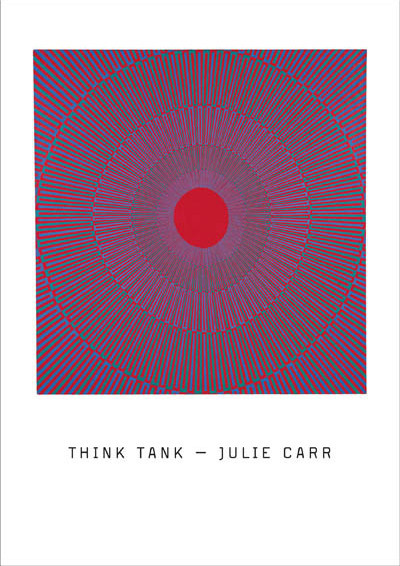Book Review
 Julie Carr’s marvelous new collection, Think Tank, begins with an epigraph from Emily Dickinson’s poetry: “if all, is all, / How larger be?” In many ways, this epigraph instructs the reader as to how to approach the beautifully crafted poems in this extended sequence. As the book unfolds, Carr explores the myriad ways that conventionally poetic language can be brought into new syntactic and thematic contexts. Frequently pairing vastly different types of language and rhetoric, Carr’s poems almost always operate by way of striking juxtapositions, offering us language that crackles, sizzles, and hums. What’s most impressive about Carr’s new collection, though, is the way that she reveals all of language as sedimented with history, as every linguistic construction becomes fraught with tension, rife with conflict between new and old.
Julie Carr’s marvelous new collection, Think Tank, begins with an epigraph from Emily Dickinson’s poetry: “if all, is all, / How larger be?” In many ways, this epigraph instructs the reader as to how to approach the beautifully crafted poems in this extended sequence. As the book unfolds, Carr explores the myriad ways that conventionally poetic language can be brought into new syntactic and thematic contexts. Frequently pairing vastly different types of language and rhetoric, Carr’s poems almost always operate by way of striking juxtapositions, offering us language that crackles, sizzles, and hums. What’s most impressive about Carr’s new collection, though, is the way that she reveals all of language as sedimented with history, as every linguistic construction becomes fraught with tension, rife with conflict between new and old.
With that in mind, Carr skillfully presents the sublime alongside the grotesque, evoking the inherent instability of the various definitions of beauty that circulate within culture. She suggests that although our aesthetic judgments arise out of a deeply problematic past, rife with violence and iniquity, these values remain inherently changeable. Carr’s interest in the subjectivity of our conceptions of beauty is visible even in her smallest stylistic choices. Consider this passage:
…the law is going to take his life away. Bracken
is the mind suspended above the floor knows of wheat fields and branches
horizontally lusting. An exquisite flower just today
opens. How best to
empty it?
Here the speaker’s ambivalence towards history, with its strict binaries and repeated dehumanization of the individual subject, is enacted in the texture of the language itself. Carr begins with a very literal statement about what culture at large would define as a crime and its punishment (“the law is going to take his life away”). I’m intrigued by her movement away from this straightforward language into a higher register, offering us language that reads as conventionally poetic, even elegiac. By moving in such a way, Carr suggests that what would be considered an appropriate subject for such aestheticized language is constantly shifting. I find Carr’s use of very high, overtly poetic diction to describe what seems like a grotesque act to be thought-provoking, particularly as she shows us that our aesthetic judgments are constantly metamorphosing, changeable even in the values that they embody. Yet Carr also calls our attention to the ways in which the past and its discontents remain omnipresent within every word, every linguistic construction that we encounter. Think Tank is filled with carefully executed poems like this one, in which inherited language is carried forth into new thematic and syntactic contexts.
Along these lines, Carr gracefully situates conventionally poetic language in striking contexts, suggesting that new definitions of beauty frequently embody old binaries, problematic assumptions, and an inevitably difficult past. Carr shows us that even as we dismantle these binaries, they are frequently present within our thinking, serving as a foundation for modern thought, even if it’s one that we react against. She writes, for example, midway through the collection:
Lamp’s askew. Asky
little girl’s in a NY gym, allalone
Lamented mall: a ghost box. They the
objects, miss us. Dogged
cry through cracked sky
Breath surrounds the
book
What’s interesting about this passage is the way that Carr pairs contemporary imagery (a “NY gym,” a “lamented mall,” and “the objects” that populate the speaker’s life) with the language of what seems like Romantic poetry (“a ghost box,” a “cracked sky,” and “breath” surrounding “the book”). Carr shows us through her subtle pairings of poetic language with unexpected imagery that inherited wisdom still circulates within culture, even if it is merely a point of departure for what we consider modern life. By doing so, Carr subtly implies that the past, and the reactions it elicits, determine what is possible within contemporary culture. For Carr, there is no escaping our linguistic inheritance, however much we try to dismantle it. What’s most impressive about Think Tank is the way Carr calls our attention to the myriad ways everyday language is sedimented with history, forcing the reader to confront a linguistic past that is rife with contradictions. Carr’s work is at once philosophical and technically precise in a way that is all too rare in contemporary poetry. This new collection is a beautiful addition to her already accomplished body of work.
About the Reviewer
Kristina Marie Darling is the author of over twenty books, which include Melancholia (An Essay) (Ravenna Press, 2012), Petrarchan (BlazeVOX Books, 2013), and Scorched Altar: Selected Poems and Stories 2007-2014 (BlazeVOX Books, 2014). Her awards include fellowships from Yaddo, the Ucross Foundation, the Helene Wurlitzer Foundation, and the Hawthornden Castle International Retreat for Writers, as well as grants from the Kittredge Fund, the Elizabeth George Foundation, and the Rockefeller Foundation Archive Center. She was recently selected as a Visiting Artist at the American Academy in Rome.